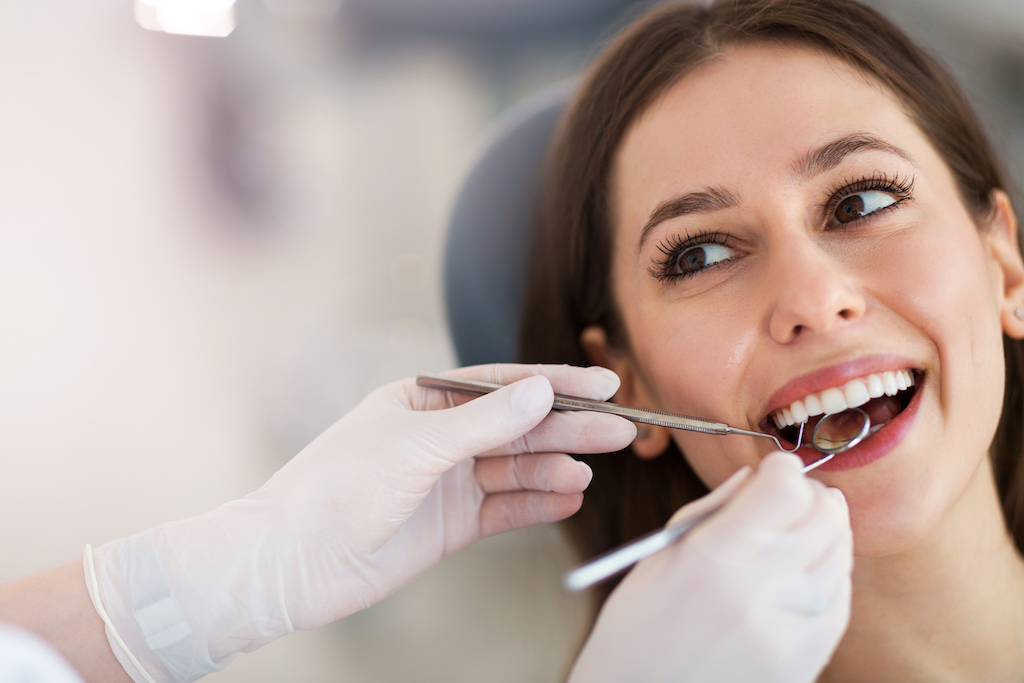 Photo Credit: Shutterstock
Photo Credit: Shutterstock
What are a few subtle signs you must visit your dentist?
Bleeding gums while you floss or brush, dry mouth, bad breath that seems to onset quickly after brushing, yellowing, or darkening of the teeth, new chips, cracks or fractures on the teeth, are all signs that you must visit your dentist.
What are a few ways you could be damaging your health and you don’t even realize it?
As we age, and as the stressors of adulthood overcome us, grinding, and clenching become determinantal parafunctional habits that really play a toll on the well being of our teeth. These habits make our enamel thin and weak, making our teeth more susceptible to breakage and decay. Not flossing, and not using a water flosser at least once daily, will cause an accumulation of bad bacteria below the gum line, that places the mouth at risk for gum disease. Gum disease has been linked to not only the early loss of teeth, but has been scientifically proven to be a culprit in heart disease as well. It is important to make flossing part of your daily hygiene regimen to ensure the health of not only your teeth but your body.
What are a few dangerous health symptoms you could easily overlook?
No part of your body should bleed spontaneous, or when slightly provoked. Flossing is such a benign thing we do, so if you are bleeding when you are flossing that is a sign of active gum disease in your mouth. Some spit out the blood and move on, not thinking twice, but the mechanism of action in gum disease is all these inflammatory cells active and ready to fight an infection, but the expense is loss of bone and tissue, which ultimately lead to tooth loss and decay.
Sloughing tissue could also be a serious sign of a potential health problem. Sloughing tissue could be anything from an allergic reaction to a oral hygiene product or something you are ingesting, or it can be as severe as a potential autoimmune disease targeting your soft tissue in the mouth. It is important to visit your dentist to identify the reason.
Oral thrush, or that white filament in the mouth could be from potential overuse of antibiotics or excessive antiseptic rinses, but could also be attributed to low immunity. See you doctor to identify the diagnosis.
What are the worst mistakes you could make while trying to become healthier?
There are a lot of hyped health treatments on the internet, and many not backed by science, or tested long enough to truly understand its side effects. Make sure that your dental products you use, from the toothpaste to the floss, have been tested as tried and true. Some of these newer products are negating science, and using products that they deem more effective that the traditional medicaments, make sure to stay vigilant and do your research, utilizing the literature that comes directly from a reputable source.
What are a few tips that will make you the most instantly healthier?
Eating well, sleeping enough, and exercising effectively, are the most standard but the most effective health tip that can be given. The importance of eating well can not be overly stated. What we consume affects so much of our body’s output, its ability to fight infection, and thrive. Sleep, and sleep well. You need the energy to not only get through our busy days, but sleep is our repair center, it brings us back to life every morning. Exercising enough to get the heart rate up a bit is wonderful for your cardiovascular health, it also certainly helps you sleep more effectively.
Why might you have bad breath?
Bad breath could be linked to gum disease, or even acid reflux. You want to practice good oral hygiene daily, as well as see your dental hygienist for regular cleanings to minimize the chances of bad breath. Bad breath linked to your gastroesophageal reflux or regurgitation. See your doctor if you find that your halitosis may be linked to your GERD or acid reflux.
What might be a few surprising facts about your health?
The most surprising fact about health is how quickly it can dwindle, but at the same time advance. Be sure to stay on top of your health by eating well, exercising, and sleeping a sufficient amount of time each night.
For more information, visit Dr. Brian A. Levine's social media:

























